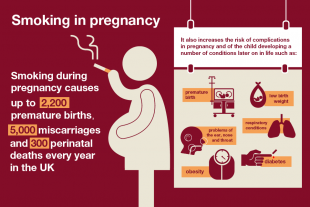Smoking during pregnancy is harmful to both the mother and their unborn child. It is the main modifiable risk factor associated with a range of poor pregnancy outcomes.
 Although rates are lower than in the past, just under 11% of women in England are recorded as smoking at the time of delivery, which translates into more than 70,000 infants born to smoking mothers each year. As part of International Midwives Day we want to celebrate the role midwives play in supporting women to be fit for pregnancy and ask that all midwives make a commitment to help reduce the numbers of women smoking in pregnancy.
Although rates are lower than in the past, just under 11% of women in England are recorded as smoking at the time of delivery, which translates into more than 70,000 infants born to smoking mothers each year. As part of International Midwives Day we want to celebrate the role midwives play in supporting women to be fit for pregnancy and ask that all midwives make a commitment to help reduce the numbers of women smoking in pregnancy.

The harmfulness of smoking in pregnancy is well known and what a midwife does and says at both the pre-conception and pregnancy stage really matters for increasing the number of women having a smokefree pregnancy. We also know that those from more deprived sectors of society are more likely to smoke during pregnancy thus leading to health inequalities. As trusted advisors at this vital and special time midwives have the opportunity to use evidence-based information and interventions to help future and expectant mothers to make the best choice for their child and themselves and reduce inequalities.
It is important to identify women who smoke as early in their pregnancy as possible and refer them for specialist stop smoking support. For some women it can be hard to admit they are still smoking and many will find it difficult to quit.
Being smokefree is the best thing a woman and her partner can do to protect their own health and the health of their baby, both during pregnancy and after. Stopping smoking early in pregnancy can almost entirely prevent damage to the baby. It is never too late to stop, but the earlier the better. Quitting and remaining smokefree can be difficult, and like many smokers expectant parents may need help, so we would encourage all health professionals to engage with women and their families on this issue, use the resources that are available to provide information and refer all smokers to their local stop smoking service for specialist support. These services will provide women with a combination of behavioural support and information about/access to stop smoking products to help them effectively manage any nicotine withdrawal cravings.
Electronic cigarette use continues to rise and midwives are being increasingly asked for advice in relation to their use during pregnancy. The Smoking in Pregnancy Challenge Group has produced a short briefing to assist health professionals in responding to some of the most frequently asked questions. Key messages include:
- Stopping smoking is one of the best things a woman and her partner can do to protect the health of their baby through pregnancy and beyond
- Although not completely risk free, electronic cigarettes carry a fraction of the risk of smoking for users, with no known risks to bystanders
- Electronic cigarettes do not contain carbon monoxide (CO) or many of the other harmful chemicals found in cigarettes
- While licensed nicotine replacement products are the recommended option for women trying to quit smoking, if a pregnant woman chooses to use an electronic cigarette and if that helps her to stay smokefree, she should not be discouraged from doing so
This briefing is available online at: Use of Electronic Cigarettes in pregnancy: A guide for midwives and other health professionals.
We know many midwives do not feel they have adequate training and knowledge to address smoking in pregnancy and while some training on this issue is included in undergraduate midwifery and medical syllabuses, more practical skills around simple behaviour change techniques and very brief advice are often not being taught. A short e-learning module is been developed on delivering very brief advice (VBA) on smoking to pregnant women, including carbon monoxide (CO) screening, which provides information on the harms of smoking and demonstrates how to conduct a brief meaningful conversation on this issue. This can be accessed through the National Centre for Smoking Cessation and Training (NCSCT) and RCM iLearn. A written briefing is also available.
There are resources for both midwives and pregnant women to help explain the dangers associated with carbon monoxide (CO). The Smokefree and Start4Life websites also provide useful information and resources for women and their families.
Whilst the role of the midwife is key, it is important that others involved in the care of pregnant women, those with young families and those who may become mothers in the future also have the knowledge, skills and confidence to engage effectively on these issues. This includes maternity support workers, health visitors, nursery nurses, ultrasonographers, family nurse practitioners and school nurses.
The government published its Tobacco Control Plan in July 2017 which includes an ambition of a smokefree pregnancy for all. It states, ‘Every child deserves the best start in life, so we aim, by the end of 2022 to: Reduce the prevalence of smoking in pregnancy from 10.7% to 6% or less.’
There is a strong ambition at national and local levels to address this challenge, with comprehensive action underway through the maternity transformation and stillbirth reduction programmes. A key component is ensuring midwives, doctors and other healthcare professionals have the right skills to conduct conversations with pregnant women who smoke and help them to access the support they need to quit.
So please make your vital contribution and embed health improvement in your practice by helping to increase the number of women having a smokefree pregnancy.
Jane Scattergood is the Midwifery Adviser at Public Health England
